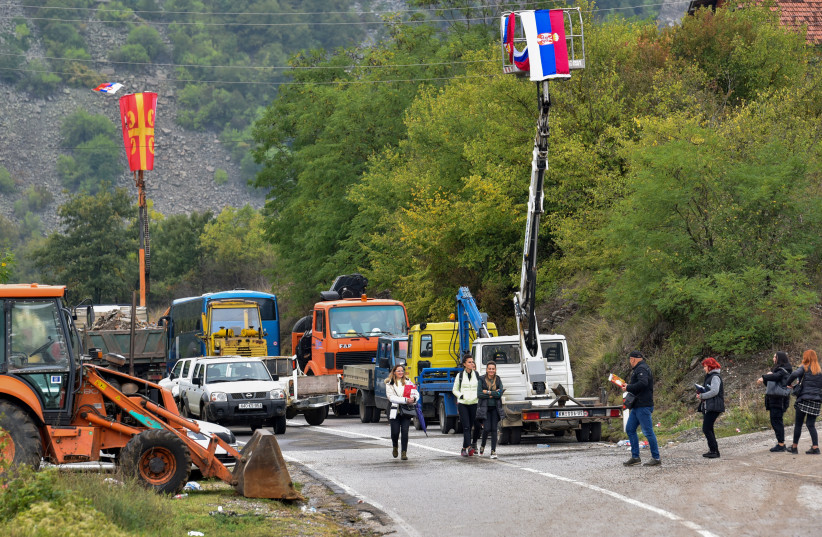Reports on Friday indicated that tensions in Kosovo could be increasing. Serbia has indicated it could demand its armed forces return to a part of Kosovo along the border where Serbs live. Kosovo is also increasing the presence of its police in the north of the country.
Some of the tensions are local and relate to a license plate dispute. The Financial Times noted two weeks ago that “Kosovo has bowed to US pressure and agreed to continue talks with Serbia, as western anxiety grows over Pristina’s plan to crack down on ethnic Serbs who refuse to accept its jurisdiction.
Thousands of ethnic Serbs have refused to switch Belgrade-issued licence plates on their cars to ones issued by Kosovo, with the resulting tensions threatening to undermine stability in the western Balkans.” However, the larger story is more complex.
The NATO intervention of 1999
According to Anadolu media in Turkey, “Belgrade harshly criticized the move as an attempt to invade the north of the country and violating the Brussels Agreement, a 2013 deal to normalize relations between Serbia and Kosovo.” Serbia appears to believe that NATO’s forces in Kosovo are not doing their historic work and that Serbs in Metohija may be threatened. This is a legacy of the 1990s when there were conflicts throughout the Balkans. The US led an intervention in Kosovo in 1999 when NATO bombed Serbia to get Serbian forces to withdraw.
The result of that war has more meaning today because Russia was at the time backing Kosovo and there was a brief moment when it appeared that Russian troops might clash with the West over Pristina International Airport. At the time the situation was sorted out, many Serbs fled Kosovo and Kosovar Albanians, who had fled fighting before and during the war, returned. Kosovo declared independence in 2008. Kosovo would like to join the EU, a fact that was hammered home last week during an EU meeting in Tirana. "Kosovo will be submitting its application for EU membership by the end of this year," Kosovo president, Vjosa Osmani-Sadriu, said.
The Western Balkans summit with the EU in Tirana was important. According to Reuters “European Council chief Charles Michel said he hoped there would be a ‘positive signal’ at an EU summit on Dec. 15-16 on Bosnia's bid for EU candidacy status and German Chancellor Olaf Scholz said visa liberalization for Kosovo was necessary.” Germany, France and the US both see important moves ahead. But tensions could derail this.

Historic tensions
An article at the European Council on Foreign Relations noted last week that “recent elections in both Kosovo and Serbia installed stable governments with strong electoral mandates. Stable governments with parliamentary majorities are vital ingredients for the normalization of relations between Western Balkans states.
Previously, a lack of political support – especially in Kosovo – has hampered efforts to fully normalize relations between the two countries, alongside internal political battles in the fragile minority or coalition governments.” It also noted that “Russia’s war in Ukraine serves as a painful reminder that frozen conflicts on the European continent could thaw at any time. This has intensified the US and the EU efforts to move the dialogue process forward.”
The tensions between Kosovo and Serbia have historic reasons but also there have been new tensions over license plates and elections. There were tensions in August as well. Images online have shown masked men patrolling streets in northern Kosovo and also shown police being deployed.
The decision by Kosovo to likely apply for EU membership soon, as well as Russia’s interests in provoking tensions in the Balkans, and the very real issues that confront people in daily life in northern Kosovo over who issues license plates to the Serbian minority areas; are all coming together in the winter of 2022. It remains to be seen whether the positive discussions in Tirana will prevail or whether more escalation will happen.
Kosovo and Serbia both have positive relations with Israel. Israel recently established ties with Kosovo in 2020. Some countries have refused to recognize Kosovo. Around half the UN member states recognize Kosovo, but there are states in Europe and Central Asia that do not recognize the country, usually because they are anti-Western or think recognition might put wind in the sails of other regions that want independence in their own country.
